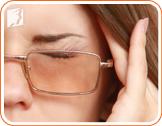
Menopausal headaches, like other symptoms of menopause, have a tendency to strike at the most inappropriate moments. Severity and frequency differs between people. When experienced frequently during menopause, headaches may affect productivity at work or quality of life, so it is important to take steps to prevent them.
How do I Prevent Headaches?
A lot of how-to articles focus on how to cure a headache rather than how to prevent them in the first place. Rather than opting medications or therapy, read on for advice on how to take steps throughout menopause which may help prevent symptoms.
Stay Hydrated

It's often-repeated advice, but drinking enough water has benefits for every part of your body. Water comprises the majority of blood and the oxygen it transports. Make sure you're drinking at least eight glasses of water every day. In addition, you can stay hydrated by eating fruit and vegetables, which have high water contents.
Avoid Caffeine

Just as important as what you put in your body are those things you avoid. Caffeine is a diuretic that can dehydrate the body and lose electrolytes at a much faster pace than normal, thus speeding up dehydration. It can also cause your blood vessels to constrict, making it harder for nutrients to travel from one part of the body to another.
Keep a Headache Journal

Everyone has unique headache triggers, so it's important you observe what you are doing immediately before the onset of a headache. It may be certain foods or drinks that you're consuming, a particular physical activity or an environmental stressor. If you make notes about when and where you encounter these triggers, you can make an effort to avoid or lessen them.
Go Organic
Processed foods like some cheeses, chocolate and instant meals have additives to preserve them and enhance flavor. However, these chemicals could also be the cause of your frequent headaches.
Rest

Many people reason that if they can get in an extra hour or two of work per day, they'll have accomplished something great. In reality, extra hours of work often mean a reduction in the amount of sleeping hours, increasing the likelihood of headaches. Make sure you're getting at least eight hours of sleep every night.
Sources
- U.S. Department of Health and Human Services.(n.d)."Migraines".Retrieved from www.womenshealth.gov.
- Dr. Lichten, Edward. "Menopausal migraine: The Role of Hormonal Replacement." The Menopausal Syndrome. Scottsdale, Arizona January 27, 1990. Reid-Rowell, Inc. Pages 21-24
- Mayo Clinic.(n.d)."Migraines." Retrieved from www.mayoclinic.com.



